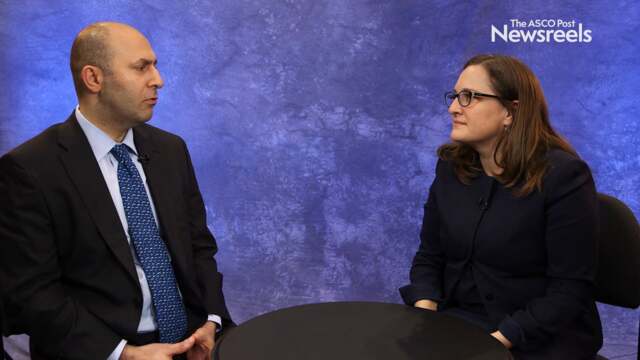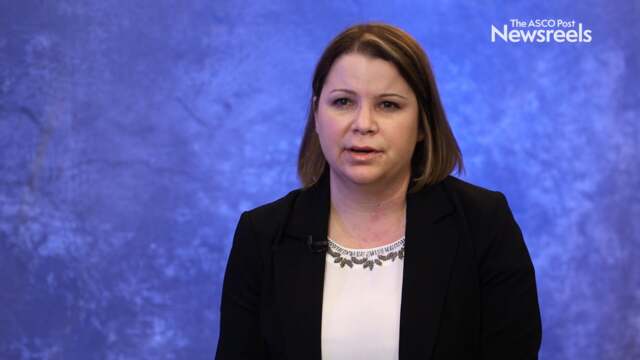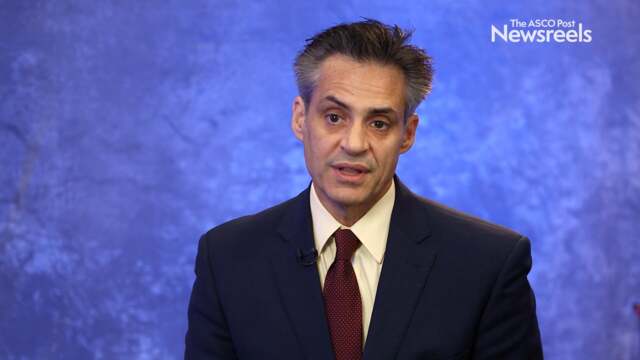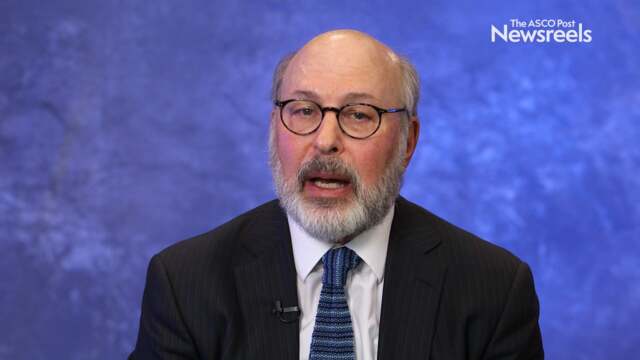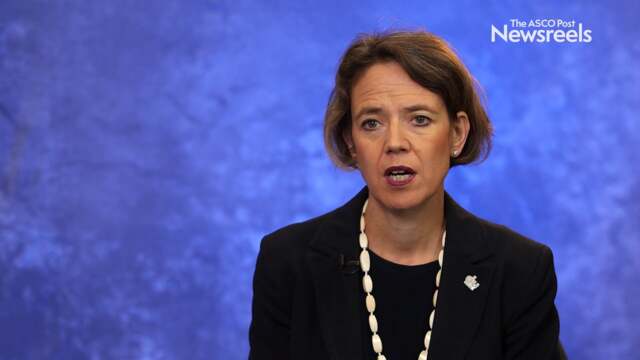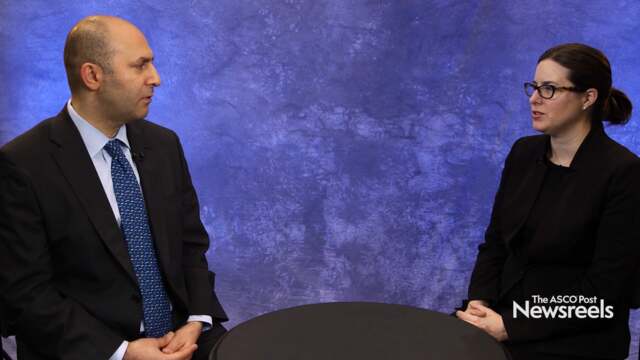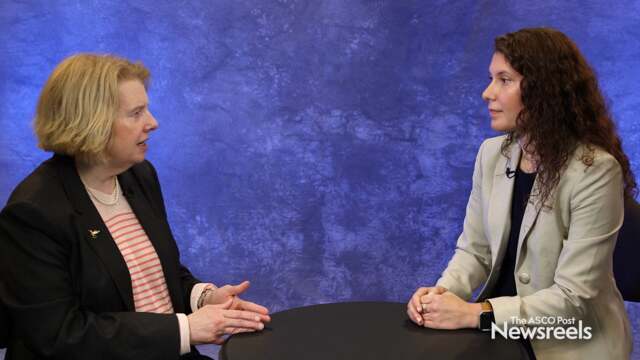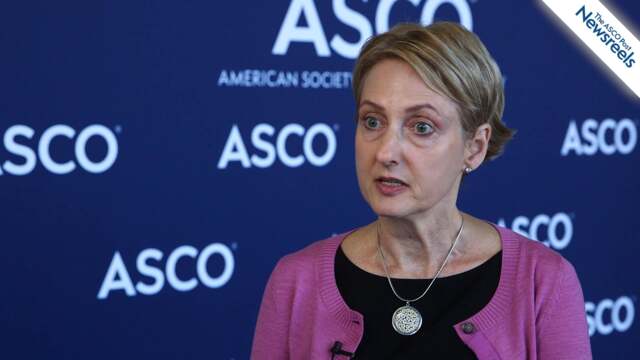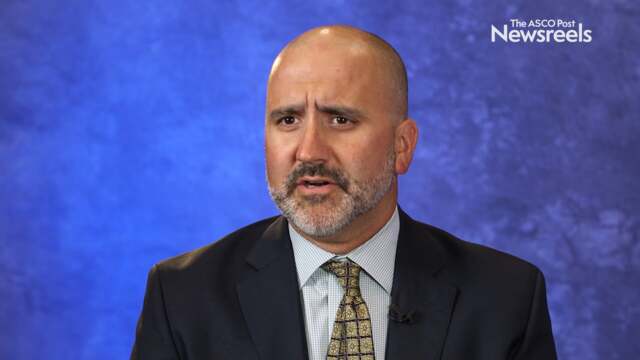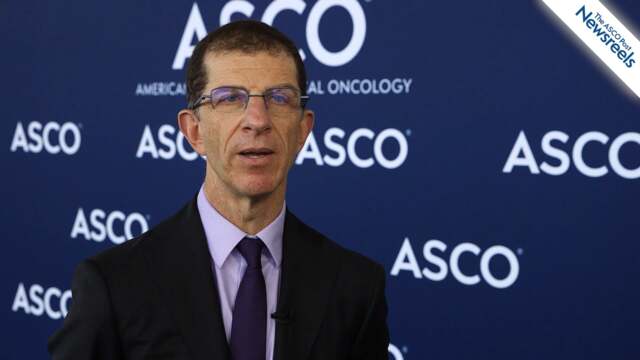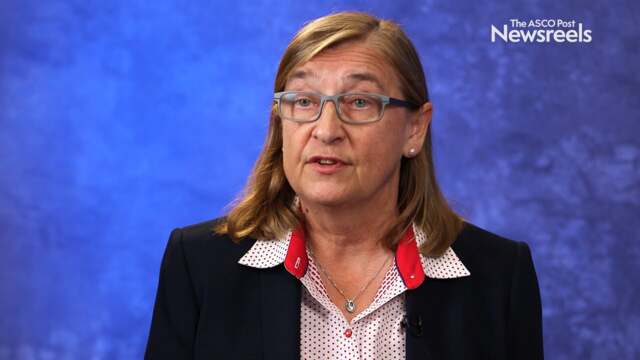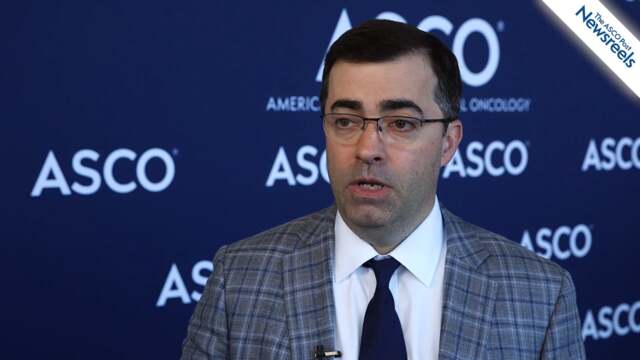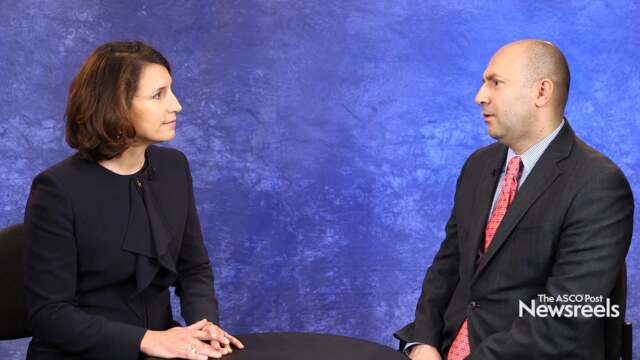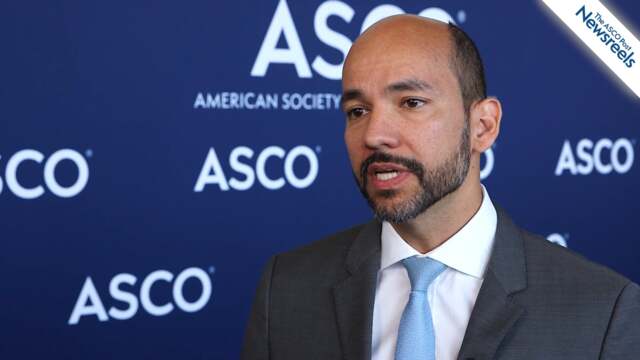New Guide Helps Clinicians Navigate Immunotherapy in Merkel Cell Carcinoma
Fred Hutchinson Cancer Research Center researchers have published a new guide to help clinicians navigate a recent revolution in care for advanced Merkel cell carcinoma. The guide was published in JNCCN–Journal of the National Comprehensive Cancer Network, and it accompanies NCCN’s new...
IMpassion130: Atezolizumab Plus Nab-Paclitaxel in Metastatic or Locally Advanced Triple-Negative Breast Cancer
The phase III IMpassion130 study has met its co-primary endpoint of progression-free survival (PFS). Results demonstrated that the combination of atezolizumab (Tecentriq) plus nab-paclitaxel (Abraxane) as first-line treatment significantly reduced the risk of disease worsening or death in patients...
Outcomes of Tisagenlecleucel Therapy in Children and Young Adults With B-Cell Acute Lymphoblastic Leukemia
As reported in The New England Journal of Medicine by Shannon L. Maude, MD, PhD, of Perelman School of Medicine, University of Pennsylvania, Philadelphia, and colleagues, the phase II ELIANA trial has shown that the anti-CD19 chimeric antigen receptor (CAR) T-cell therapy tisagenlecleucel (Kymriah) ...
FDA Accepts sBLA for Pembrolizumab as Adjuvant Therapy in Advanced Melanoma
The U.S. Food and Drug Administration (FDA) has accepted for standard review a new supplemental biologics license application (sBLA) for pembrolizumab (Keytruda) as adjuvant therapy in the treatment of patients with resected, high-risk stage III melanoma. The Prescription Drug User Fee Act, or...
IMpower133: Atezolizumab in Combination With Chemotherapy in Previously Untreated, Extensive-Stage Small Cell Lung Cancer
The phase III IMpower133 study recently met its coprimary endpoints of overall survival (OS) and progression-free survival (PFS) at its first interim analysis. The study demonstrated that first-line treatment with the combination of atezolizumab (Tecentriq) plus chemotherapy (carboplatin and...
FDA Accepts sBLA for First-Line Nivolumab Plus Low-Dose Ipilimumab in NSCLC With Tumor Mutational Burden ≥ 10 mut/mb
The U.S. Food and Drug Administration (FDA) recently accepted a supplemental biologics license application (sBLA) for nivolumab (Opdivo) plus low-dose ipilimumab (Yervoy) for the first-line treatment of advanced non–small cell lung cancer (NSCLC) in patients with a tumor mutational burden...
MAGE-A3 Immunotherapeutic as Adjuvant Therapy for MAGE-A3–Positive Stage III Melanoma
In the phase III DERMA trial reported in The Lancet Oncology, Dreno et al found that an adjuvant MAGE-A3 immunotherapeutic provided no benefit vs placebo in patients with resected MAGE-A3–positive stage IIIB or IIIC melanoma. Development of the agent for use in melanoma has been stopped. The ...
Trastuzumab Biosimilar vs Reference Trastuzumab in HER2-Positive Early Breast Cancer
In the phase III LILAC equivalence trial reported in The Lancet Oncology, von Minckwitz et al found similar efficacy and safety with the trastuzumab biosimilar ABP 980 vs reference trastuzumab (Herceptin) in HER2-positive early breast cancer. On local review, the risk difference and risk ratio (RR) ...
Second-Line Pembrolizumab vs Paclitaxel in Advanced Gastric or Gastroesophageal Junction Cancer
As reported in The Lancet by Shitara et al, the phase III KEYNOTE-061 trial showed no significant overall survival benefit with pembrolizumab vs paclitaxel in patients with advanced gastric or gastroesophageal junction cancer progressing on platinum-fluoropyrimidine treatment with programmed cell...
FDA Restricts Use of Pembrolizumab or Atezolizumab to Treat Urothelial Cancer Due to Efficacy Concerns in Some Patients
As of June 20, the U.S. Food and Drug Administration (FDA) has restricted the use of pembrolizumab (Keytruda) and atezolizumab (Tecentriq) for patients with locally advanced or metastatic urothelial cancer who are not eligible for cisplatin-containing therapy. The restriction results from a...
Outcomes by Chemotherapy Backbone for Obinutuzumab vs Rituximab in Previously Untreated Follicular Lymphoma
In an analysis of the GALLIUM trial reported in the Journal of Clinical Oncology, Hiddemann and colleagues found that obinutuzumab (Gazyva) appeared to provide consistent progression-free survival benefit vs rituximab (Rituxan) in previously untreated follicular lymphoma, irrespective of which...
Addition of Atezolizumab to Bevacizumab and Chemotherapy in First-Line Treatment of Metastatic Nonsquamous NSCLC
As reported at the 2018 ASCO Annual Meeting and in The New England Journal of Medicine by Socinski et al, the phase III IMpower150 trial has shown that the addition of atezolizumab (Tecentriq) to bevacizumab (Avastin) plus chemotherapy significantly improved progression-free and overall survival in ...
FDA Expands Approval of Pembrolizumab for First-Line Treatment of NSCLC
The U.S. Food and Drug Administration (FDA) recently granted accelerated approval to the immune checkpoint inhibitor pembrolizumab (Keytruda) for use in combination with chemotherapy as a first-line treatment for patients with metastatic non–small cell lung cancer (NSCLC). KEYNOTE-021 This...
Priming the Immune System: Neoadjuvant Durvalumab Plus Chemotherapy May Be Beneficial in Triple-Negative Breast Cancer
The addition of durvalumab -(Imfinzi) to anthracycline/taxane-based chemotherapy had encouraging results as neoadjuvant therapy for early triple-negative breast cancer in the randomized phase II GeparNuevo study presented at the 2018 ASCO Annual Meeting.1 The results were positive in a subgroup of...
Activity of the PD-1 Inhibitor Cemiplimab in Advanced Cutaneous Squamous Cell Carcinoma
As reported at the 2018 ASCO Annual Meeting (Abstract 9519) and in The New England Journal of Medicine by Migden et al, results of early-phase testing show activity of the programmed cell death protein 1 (PD-1) inhibitor cemiplimab in advanced cutaneous squamous cell carcinoma. Currently, no...
EHA 2018: Tisagenlecleucel Demonstrates More Than 1-Year Durability of Response in Adults With Relapsed or Refractory DLBCL
Fourteen-month results from the JULIET clinical trial showed ongoing durable responses are achievable with tisagenlecleucel (Kymriah) when administered to adult patients with relapsed or refractory diffuse large B-cell lymphoma (DLBCL). This updated analysis was presented by Borchmann et al at ...
EHA 2018: Obinutuzumab or Rituximab Plus Chlorambucil in CLL
Data from the final analysis of the CLL11 study evaluating obinutuzumab (Gazyva)-based treatment in previously untreated chronic lymphocytic leukemia (CLL) was presented by Goede et al during the Presidential Symposium at the 23rd Annual Congress of the European Hematology Association (EHA)...
KEYNOTE-224: Pembrolizumab in Advanced Hepatocellular Carcinoma Pretreated With Sorafenib
As reported in The Lancet Oncology by Zhu et al, the phase II KEYNOTE-224 study has shown activity of pembrolizumab in advanced hepatocellular carcinoma (HCC) pretreated with sorafenib. Study Details In the study, 104 eligible patients who were intolerant of or progressed on sorafenib were...
FDA Expands Approval of Pembrolizumab to Include New Lymphoma Indication
Today, the U.S. Food and Drug Administration (FDA) granted accelerated approval to pembrolizumab (Keytruda) for the treatment of adult and pediatric patients with refractory primary mediastinal large B-cell lymphoma or those who have relapsed after two or more prior lines of therapy. KEYNOTE-170...
FDA Approves Bevacizumab Plus Chemotherapy in Advanced Ovarian Cancer Following Initial Surgery
Today, the U.S. Food and Drug Administration (FDA) approved bevacizumab (Avastin) in combination with chemotherapy (carboplatin and paclitaxel) followed by bevacizumab as a single agent for the treatment of women with advanced (stage III or IV) ovarian cancer following initial surgical resection....
iLLUMINATE Trial of Ibrutinib Plus Obinutuzumab for First-Line Therapy of CLL/SLL Meets Primary Endpoint
The phase III iLLUMINATE (PCYC-1130) trial recently met its primary endpoint of improvement in progression-free survival. The study evaluated ibrutinib (Imbruvica) in combination with obinutuzumab (Gazyva) in patients with previously untreated chronic lymphocytic leukemia or small lymphocytic...
FDA Approves Pembrolizumab for Previously Treated Recurrent or Metastatic PD-L1–Expressing Cervical Cancer
On June 12, the U.S. Food and Drug Administration (FDA) approved pembrolizumab (Keytruda) for the treatment of patients with recurrent or metastatic cervical cancer and disease progression on or after chemotherapy whose tumors express programmed cell death ligand 1 (PD-L1) [Combined Positive Score...
Older Patients With Melanoma Fare Better on Anti–PD-1 Immunotherapy Than Younger Patients
Recent research has shown that the tumor microenvironment in older patients promoted melanoma metastasis and resistance to targeted therapy with a BRAF inhibitor. Now, a new study investigating the relationships among age, response to anti–programmed cell death protein 1 (PD-1)...
Rapid Progression of Adult T-Cell Leukemia/Lymphoma During PD-1 Inhibitor Therapy
In a letter to the editor in The New England Journal of Medicine, Ratner et al describe rapid progression of adult T-cell leukemia/lymphoma (ATLL) in three consecutive patients receiving programmed cell death protein 1 (PD-1) inhibitor therapy with nivolumab (Opdivo). As stated by the authors,...
2018 ASCO: Lenalidomide Plus Rituximab vs Rituximab Plus Chemotherapy in Previously Untreated Follicular Lymphoma
Results from RELEVANCE, a phase III, randomized, open-label, international clinical study conducted in partnership with the Lymphoma Academic Research Organisation (LYSARC), were presented by Fowler et al at the 2018 ASCO Annual Meeting (Abstract 7005). This study evaluated the investigational...
2018 ASCO: Pembrolizumab Plus Chemotherapy as First-Line Treatment of Metastatic Squamous NSCLC: KEYNOTE-407 Study
Results from KEYNOTE-407, a randomized, double-blind, placebo-controlled, phase III study evaluating pembrolizumab (Keytruda) in combination with carboplatin/paclitaxel or carboplatin/nab-paclitaxel (Abraxane) as first-line treatment for metastatic squamous non–small cell lung cancer...
2018 ASCO: Pomalidomide, Bortezomib, and Low-Dose Dexamethasone in Relapsed or Refractory Multiple Myeloma
For patients with multiple myeloma who have been treated with lenalidome (Revlimid) but have relapsed and not responded to other therapy, a three-drug combination can significantly extend the time in which the disease is held in check. The findings of the phase III OPTIMISMM trial were presented by ...
2018 ASCO: KEYNOTE-427 Trial Evaluates Immunotherapy in Advanced Clear Cell Renal Cell Carcinoma
Interim results from cohort A of KEYNOTE-427, a phase II trial evaluating pembrolizumab (Keytruda) as first-line treatment for advanced clear cell renal cell carcinoma (RCC), were presented by McDermott et al at the 2018 ASCO Annual Meeting (Abstract 4500). Interim data showed an overall response...
Adoption of Anti–PD-1 Agents Into Clinical Practice and Age Differences in Practice vs Pivotal Clinical Trials
In a retrospective cohort study reported in JAMA Oncology, O’Connor et al found that anti–programmed cell death protein 1 (PD-1) agents rapidly reached eligible patients after U.S. Food and Drug Administration (FDA) approval. The study also showed that real-world patients were...
2018 ASCO: 2-Year Update of Pivotal JAVELIN Merkel 200 Trial Shows Continued Durable Responses With Avelumab
Updated efficacy and safety data from the international, multicenter JAVELIN Merkel 200 trial of avelumab (Bavencio) in patients with metastatic Merkel cell carcinoma were presented by Nghiem et al at the 2018 ASCO Annual Meeting (Abstract 9507). 2-Year Follow-up At the 2-year follow-up update of ...
Toni K. Choueiri, MD, and Elizabeth R. Plimack, MD, on RCC: Perspectives on KEYNOTE-427 and IMmotion151
Toni K. Choueiri, MD, of Dana-Farber Cancer Institute, and Elizabeth R. Plimack, MD, of Fox Chase Cancer Center, offer their analysis of two key studies presented in renal cell cancer.
Juliet Elizabeth Wolford, MD, on Ovarian Cancer: The Cost of Care
Juliet Elizabeth Wolford, MD, of the University of California, Irvine, discusses the cost-effectiveness of various types of maintenance therapy in advanced ovarian cancer: paclitaxel, bevacizumab, niraparib, rucaparib, olaparib, and pembrolizumab (Abstract 5508).
Robert L. Coleman, MD, on Ovarian Cancer: Results From an NRG Oncology/Gynecologic Oncology Group Trial
Robert L. Coleman, MD, of The University of Texas MD Anderson Cancer Center, discusses phase III study findings on secondary surgical cytoreduction followed by platinum-based combination chemotherapy, with or without bevacizumab, in platinum-sensitive, recurrent ovarian cancer (Abstract 5501).
Howard S. Hochster, MD, on Colorectal Cancer: Results From the E7208 Trial
Howard S. Hochster, MD, of Rutgers-Cancer Institute of New Jersey, discusses study findings on irinotecan and cetuximab vs irinotecan, cetuximab, and ramucirumab as second-line therapy of advanced colorectal cancer following oxaliplatin and bevacizumab-based therapy (Abstract 3504).
2018 ASCO: iNNOVATE Trial Evaluates Ibrutinib in Combination With Rituximab in Patients With Waldenström's Macroglobulinemia
Results from a preplanned interim analysis of the phase III iNNOVATE (PCYC-1127) study evaluating the investigational use of ibrutinib (Imbruvica) in combination with rituximab (Rituxan) in relapsed/refractory and treatment-naive patients with Waldenström’s macroglobulinemia were...
Sibylle Loibl, MD, PhD, on Triple-Negative Breast Cancer: Results From the GeparNuevo Trial
Sibylle Loibl, MD, PhD, of the German Breast Group, discusses phase II study findings on the addition of durvalumab to a taxane-anthracycline–containing chemotherapy in triple-negative breast cancer (Abstract 104).
Toni K. Choueiri, MD, and Lauren C. Harshman, MD on RCC: Results From the PROSPER Trial
Toni K. Choueiri, MD, and Lauren C. Harshman, MD, both of Dana-Farber Cancer Institute, discuss phase III study findings on perioperative nivolumab vs observation in patients with localized renal cell carcinoma undergoing nephrectomy (Abstract TPS4597).
Bernard J. Escudier, MD, on RCC: Results From the IMmotion151 Trial
Bernard J. Escudier, MD, of Gustave Roussy, discusses patient-reported outcomes for atezolizumab plus bevacizumab vs sunitinib in treatment-naive metastatic renal cell carcinoma (Abstract 4511).
Ursula A. Matulonis, MD, and Stéphanie Gaillard, MD, PhD, on Ovarian Cancer: Results From an NRG Oncology/COG Trial
Ursula A. Matulonis, MD, of Dana-Farber Cancer Institute, and Stéphanie Gaillard, MD, PhD, of Duke Cancer Institute, discuss an evaluation of bevacizumab in the primary treatment of advanced ovarian cancer (Abstract 5517).
Laurie Helen Sehn, MD, MPH, on FL and DLBCL: Results From a Treatment Trial
Laurie Helen Sehn, MD, MPH, of the British Columbia Cancer Centre for Lymphoid Cancer, discusses phase II study findings on polatuzumab vedotin with bendamustine and rituximab in relapsed or refractory follicular lymphoma and diffuse large B-cell lymphoma (Abstract 7507).
David M. O’Malley, MD, on Ovarian Cancer: Early Results From the FORWARD II Study
David M. O’Malley, MD, of The Ohio State University College of Medicine, discusses phase Ib study findings on mirvetuximab soravtansine, a folate receptor alpha-targeting antibody-drug conjugate, in combination with bevacizumab in patients with platinum-resistant ovarian cancer (Abstract 5549).
Danny Rischin, MD, on Squamous Cell Carcinoma: Treatment Trial Results
Danny Rischin, MD, of Peter MacCallum Cancer Centre, discusses phase II study findings on cemiplimab, a human monoclonal anti–PD-1 antibody, in patients with metastatic cutaneous squamous cell carcinoma (Abstract 9519).
Helena Margaret Earl, MBBS, PhD, on Early Breast Cancer: Results From the Persephone Trial
Helena Margaret Earl, MBBS, PhD, of the University of Cambridge, discusses phase III study findings on 6 vs 12 months of adjuvant trastuzumab in patients with HER2-positive early breast cancer (Abstract 506).
Peter Hillmen, MB, ChB, on CLL: Results From the MURANO Trial
Peter Hillmen, MB, ChB, of St James’s University Hospital, discusses phase III study findings on minimal residual disease negativity with venetoclax plus rituximab in relapsed or refractory chronic lymphocytic leukemia (Abstract 7508).
David F. McDermott, MD, on RCC: Results of the KEYNOTE-427 Trial
David F. McDermott, MD, of Beth Israel Deaconess Medical Center, discusses study findings on pembrolizumab monotherapy as first-line therapy in advanced clear cell renal cell carcinoma (Abstract 4500).
Lee S. Schwartzberg, MD, on Using Immunotherapy in the Community Setting: 2018 Update on an ACCC Program
Lee S. Schwartzberg, MD, of West Cancer Center, reports on the progress of the ACCC Immuno-Oncology Institute to speed adoption of immunotherapeutics in community practices.
Nathan Hale Fowler, MD, and Julie M. Vose, MD, MBA, on Follicular Lymphoma: Results From the RELEVANCE Trial
Julie M. Vose, MD, MBA, of the University of Nebraska Medical Center, and Nathan Hale Fowler, MD, of The University of Texas MD Anderson Cancer Center, discuss phase III study findings on lenalidomide plus rituximab vs chemotherapy plus rituximab, followed by rituximab maintenance, in patients with previously untreated follicular lymphoma (Abstract 7500).
Laurence Albiges, MD, PhD, and Toni K. Choueiri, MD, on RCC: Novel Combinations for Advanced Disease
Toni K. Choueiri, MD, of Dana-Farber Cancer Institute, and Laurence Albiges, MD, PhD, of Gustave Roussy, discuss two treatment studies: one testing pegilodecakin with nivolumab or pembrolizumab and the other evaluating an oral CXCR4 inhibitor in combination with axitinib (Abstracts 4509 & 4510).
Gilberto Lopes, MD, MBA, on NSCLC: Results From the KEYNOTE-042 Trial
Gilberto Lopes, MD, MBA, of the Sylvester Comprehensive Cancer Center at the University of Miami, discusses phase III findings on pembrolizumab vs platinum-based chemotherapy as first-line treatment for advanced/metastatic non–small cell lung cancer with a PD-L1 tumor proportion score ≥ to 1% (Abstract LBA4).
2018 ASCO: KEYNOTE-042 Trial Compares Pembrolizumab With Chemotherapy as First-Line Treatment of NSCLC With PD-L1 Expression of 1% or More
A large, randomized phase III trial shows that the immunotherapy pembrolizumab (Keytruda) is a more effective initial treatment than chemotherapy (the current standard of care) for the majority of patients with the most common type of lung cancer. People with advanced non–small cell lung...
